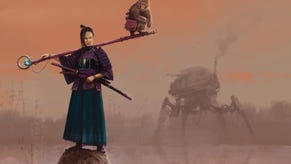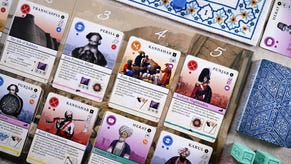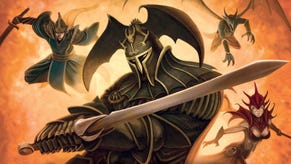Game of the Year 2019 guest list: Root and Pax Pamir 2E designers Cole and Drew Wehrle
Wehrlegig Games on the appeal of tabletop experiences with an ‘uncompromising vision’.
Cole and Drew Wehrle are the brothers behind Wehrlegig Games, the publishers of this year’s second edition of Pax Pamir - 2019’s standout Game of the Year for Dicebreaker’s Matt Jarvis. Cole Wehrle is also the designer of board games including Root, John Company - due a second edition from Wehrlegig in the future - and the upcoming Oath from Leder Games. We spoke to the pair at this year’s PAX Unplugged to ask them about their favourite games of 2019.
Cole: Each year when a new Sierra Madre [Games, publisher of the Pax series of complex historical games,] game comes out from Phil [Eklund]'s company, we play it. Usually we could get them around the time of BGG Con. Sometimes I start hating the game and then I come to like it, or I sort of, like, hate it. But this year, Pax Transhumanity came out and it's very good. It's very good. It's good because it is mechanically quite sophisticated and interesting, thematically it has an amazing narrative power. It doesn't have emotional power for me yet, but that's because I'm still learning it - and I say that after playing it eight times or so. But it has just a lot of really interesting beautiful elements in the way that it handles its stories.
It's funny - a quick note on Phil's games: I think there's an interesting thing that happens when you teach games to interested newcomers. Because there's this whole logic about accessibility and gateway games and all of that. But to me it's amazing to teach midway, really complex games to newcomers and what resonates. I was showing Pax Transhumanity to one of our new ops staff and just describing the game, he was so excited. Because this was a game that was very seriously grappling with issues of finance and ideas and commercial viability, in step with how he might be actually thinking about those issues. That's tremendously exciting. So, yes, you can pull someone new in by playing an uproarious game of Skull, which is great, a great game. But there are these other ways of pulling people in.

Drew: I can't emphasise enough how delighted I've been with Pax Transhumanity this last year. That is a direct relationship to the Pax space that the game exists in.
Cole: Which we spend a lot of time in.
Drew: Right, so our brain is there. But just the same kind of narrative overhead that those games can achieve and the discussions that happen around the games. I'm coming pretty fresh off of having experienced my first matrix game [a genre of games based around debates and arguments typically chaired by an umpire] that is entirely designed to spur discussion revolving around the period and it was a fascinating experience. And now after having that, when I've entered some larger, more complex games the game around the game is entirely alluring because that's the point of a lot of these games: to get you reflecting and to even change mentality.
Cole: I'll say, too, just some other citations; the things that we thought were really good. I thought Capstone did a fabulous job with the Bus reprint, it's amazing. Bus is an amazing game. I'm so happy people are enjoying it, and I'm surprised more people aren't throwing things at each other. We have played a lot of The Estates this year. It is amazing, it's always been amazing.

Drew: Dune's reprint, I'm just glad it's out there and more accessible than ever. Though it is unrelenting and tough as ever.
Cole: It's a good game. Which is funny. These are older games, but I say for people who are interested in some of the stuff we've talked about, I always tell folks to look at the small publishers. Because there's a lot of innovation happening and they can take bigger risks. Look for the games that don't look like other games. For a long time, Oink was always our little cross because they were always doing curious things with their designs. There are other Japanese publishers that fit that, but even American publishers - like the company that published [Cole's board game about the 19th-century opium trade in China] An Infamous Traffic, Hollandspiele, they have remarkably published 50-plus games in three years. It's insane. [Founders] Tom and Mary [Russell] are treasures of the industry and they're so wonderful. But they have so many lovely little games. They have this little card game called The Toledo War about Michigan, the history of Michigan. It's incredible. It's a lovely, little 18-card game. I read the rulebook to Tom's new game Westphalia, which seems amazing. Even if the game doesn't work - I don't know if it works yet, I haven't played it yet - it is so full of interesting ideas that it's well worth engaging with.
Drew: It's just uncompromising against market trend. It's just delightful. You're seeing people realise their visions regardless of scale or impact or reprintability or whatever. That goes down to the core design of their company, of printing to orders. Which is fascinating.
Read more of Dicebreaker’s Game of the Year 2019 coverage, including the Dicebreaker team’s personal favourites and more designer picks.






